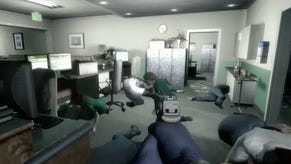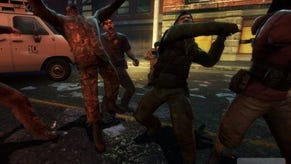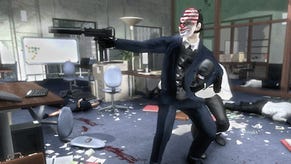Payday: The Heist Review
Crime and punishment, abridged.
Imagine the perfect robbery: you know the blueprints inside out, when the guards go for their coffee breaks, and exactly how to get into the safe. Everything goes without a hitch, and by the time the safe is found, you're laughing. Not a shot fired. Payday: The Heist doesn't work like that.
Despite the crime-caper presentation, tactical objectives and elaborate plans, Payday always comes down to shooting. Four players go into a situation - a bank with a vault full of juicy gold in the basement, an ambush to rescue a prisoner from a police convoy - and then get into a hell of a big fight with the police. It's a magpie co-op shooter, most obviously influenced by Left 4 Dead's dynamic approach to the team-based FPS and Modern Warfare's Spec Ops mode, and its developers are clearly students of the mass of 'horde' modes out there.
Payday has faults, but is very good indeed, an FPS where common elements are carefully made to fit its rhythm rather than just taken for granted: this sounds like faint praise, but it has the best ammo balancing I've seen in a long time. Players start fully-stocked and a perk can give bigger starting clips, but from that point every bullet has to be maximised. Enemies drop small amounts of ammo, but only enough to keep your head above water.
Health is equally well-handled, a mixture of an overall bar that only recharges in segments and a 'shield' that recharges wholly. The more the overall bar goes down, the faster the player is knocked down, making it a treasure to be guarded: a backup that in clutch moments gives that extra second of life.
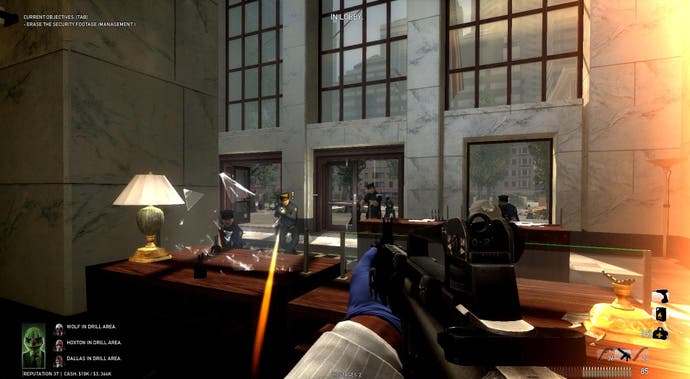
You're always on a knife-edge. A healthy team can feel invincible, but a team that's been banged up is too brittle to fight carelessly. One-time deployables can be taken into missions, and using them wisely is a whole other story.
On top of such considered engineering, Payday boasts a winning art style that mixes grotesque clown masks with sharp suits and a brutishly high-tech take on law enforcement. Even more impressive - stunning, even - is the dynamic audio design, which contributes to all of Payday's most exhilarating moments. One level will have a tight, looping drum beat that builds and builds into a pounding house tune just as all hell is breaking loose; another will begin with a cheesy piece of europop that turns into an industrial wail of sirens. It has an absolute gift for catching the right moment to push itself to the front and centre of the experience, and burrows its way into your mindset. When the sound's going crazy, so are you.
The cops are a motley bunch at the start of a mission, wearing their short-sleeved blue shirts and little caps and dying in droves. As things pick up, more capable classes start mixing into the waves: machine-gunners with light body armour, shotgunners in thick riot gear and special agents that sneak around before emptying a revolver into your back. Individually, they don't amount to much and neither does the AI, but you'll only ever see them in swarming groups that seem to come from nowhere, relentlessly battering a fixed position or skewering a moving group.
Payday's mission structure is basically 'quiet time' and then 'assault', with much more of the latter. Each of its setups has mission objectives to be completed in the middle of the shooting, but every single one involves holding down a button at a certain point then waiting for a timer to tick down. Heat it ain't, but things are kept interesting by the objectives changing position and sequence on each playthrough - a structure that comes to fruition in Diamond Heist. (More on that later.)
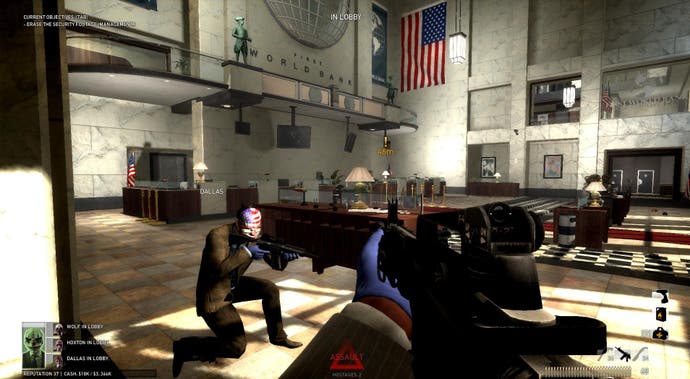
There are always small groups of cops around, but every few minutes the game sends a heavily-telegraphed wave of enemies in, which puts the game in 'Assault' mode. These relentless firefights can last from a few minutes to what feels like an eternity, but is probably more like 15 minutes - and during it, hundreds and hundreds of cops will die. They pour out of corridors, scale balconies, drop from helicopters, bust down doors, explode out of lift shafts - and if they get position on your team, the crossfire is withering.
The final twist in every assault wave is the special cops. They're half Left 4 Dead's special infected, half Modern Warfare 2's riot shields and Juggernauts - but at least they're good copies. The taser cop immobilises players with unerring accuracy, making them spasm and empty their gun's clip wildly until a team-mate intervenes or they go down. The Bulldozer's a giant that can take sustained punishment and mete it out, a terrifying sight when you're in a corner, and shield-toting cops make a slower but no less inexorable advance on your position, begging you to waste bullets. Cloakers are the one original nasty: pinpoint spec-ops soldiers that specialise in sneaking up or rushing in for a deadly melee attack and then picking off your buddies when they wander in to save the day.
The police have a lot of options and there's no telling exactly what an assault wave will contain - some wars are won at a distance with calm precision and some with a shotgun in the face. Payday only offers six missions, and some of those aren't huge, but the ebb and flow of its assault waves means it just about gets away with it - even in the same environment, with the same starting positions, no two waves play out alike.
Payday does have one recurring problem: its downtime is often too long. There will be times when, one minute after surviving a pitched battle, you're waiting on a roof for the next event to be triggered or the next police attack - and nothing happens. Payday's best moments are when it stitches its discrete chunks together seamlessly, moving from dynamic objectives into assault waves into brief respites. But every so often, it just leaves you hanging.
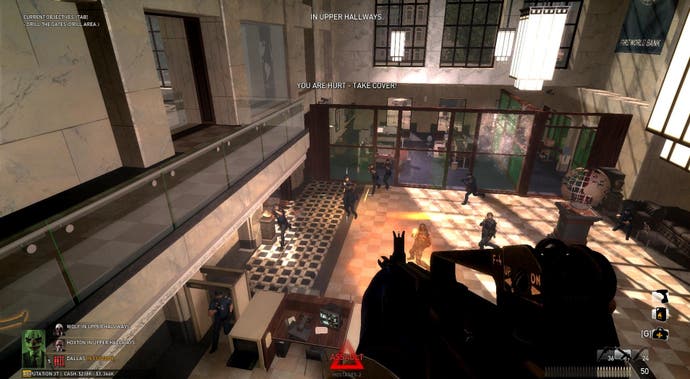
There are other flat notes. Civilians can be tied up to use as hostages - these can be traded between rounds for any team member who's gone down permanently, and cause the police to start sending in rescue squads. The mechanic fills a role capably enough but feels a little under-developed: being able to use hostages as bargaining chips or human shields during assaults, for example, would seem obvious.
Payday doesn't even go that deep, and to be fair it shows little desire to. But there are infuriating inconsistencies within its world. You must avoid killing civilians, for example, in the midst of these slaughterfests - but these civilians are so nakedly designed to keep on running into crossfire that hitting one feels like the game's pulled a trick on you.
There are plenty more moments of silliness, but Payday gets it right, too: sawing through bars and burning through vault roofs with thermite are the stuff blueprints are made of. And then there's the Diamond Heist.
In terms of robber fantasies, there are few better setups than a high-security vault filled with diamonds on the top floor of a skyscraper, slap bang in the middle of a party. Only available on Hard difficulty, Diamond Heist is easily Payday's most dynamic and varied mission, with major branches opening up differently on each play-through, and it's set in a quite brilliant environment.
The vault's in the middle, and several balcony floors rise around it full of offices and cubbyholes. Staircases lead to a huge roof with a helipad and glass skylights. The mission can be completed entirely through stealth, the four players moving silently from floor to floor disabling alarms and avoiding security patrols, before a clean getaway without a shot fired. This didn't happen a single time that I was involved.
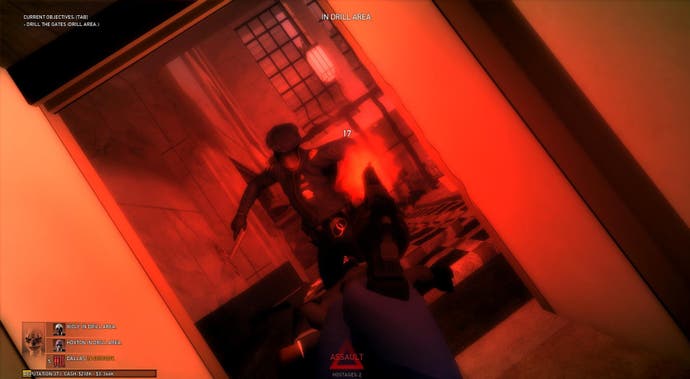
This thread of Diamond Heist is instantly cut when one of the team is spotted, and the mission lurches into a balls-to-the-wall hostage situation against an army of SWAT. Your luck changes on each play-through, too, as either the codes don't work or they do, and a hostage breaks or doesn't. Diamond Heist's running battle is a full-force slam into the best Payback's enemy AI can throw, and it excels itself: teams of cloakers running behind your lines, bulldozers sent en masse into bottlenecks, multiple tazer units covering each other, and an army of regular Joes backing them up with lethal force.
Simply surviving a wave on Diamond Heist is a rush, and the way the mission diverges freshens up each attempt. I've been in teams that weren't spotted until they were at the vault, and were then cut down methodically inches from the prize. Other games were wars of attrition from the first minute, with a single player limping away at the end with his last drop of health. Too many of Payback's other missions begin to pale after they've been completed a few times; Diamond Heist redresses the balance.
It's obvious that certain corners have been cut in Payday's development. Though the mission introductions are relatively slick voiceovers that get into the action quickly, the mood is often let down by the protagonists' walking animations: androids malfunctioning just about describes it. There were countless visual glitches during my playtime, and on rare occasions the entire police force will suddenly stop firing and moving. It's pretty creepy.
Though the world would be a better place if Payday had spent an extra three months in post-production, here it is, warty and slightly shonky in places, but built on rock-solid foundations. If it doesn't quite match up to a high watermark like Left 4 Dead, that's no great criticism, and in its very finest moments - let's mention that superb audio design again - Payday is as good as cops and robbers gets.
More of a smash and grab than a smooth raid, then, but you can't deny that it's come away with the goods.







